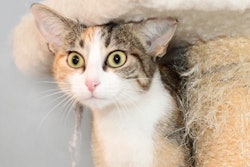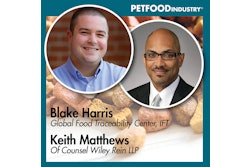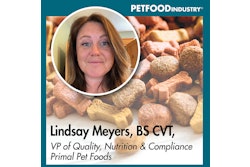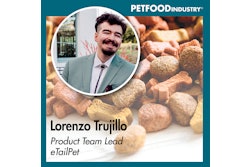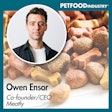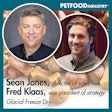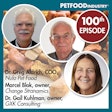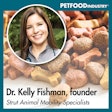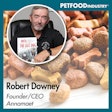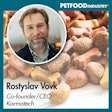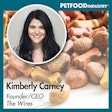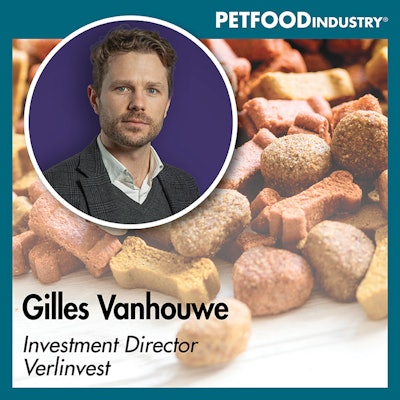
Host Lindsay Beaton and Gilles Vanhouwe, investment director with Verlinvest, delve into the current investment trends in the pet food industry.
The below transcript is from Episode 53 of the Trending: Pet Food podcast where editor Lindsay Beaton spoke with Gilles Vanhouwe, investment director with Verlinvest, about current investments trends in the pet food industry. You can find the episode at PetfoodIndustry.com/trending-pet-food-podcast, on SoundCloud or on your favorite podcast platform. This episode originally aired on January 17.
We want to thank AFB International for sponsoring this podcast. AFB is the premier supplier of palatants to pet food companies worldwide, offering off-the-shelf and custom solutions and services that make pet food, treats and supplements taste great.
Lindsay Beaton – Editor, Petfood Industry magazine and Host, Trending: Pet Food podcast: Hello, and welcome to Trending: Pet Food, the industry podcast where we cover all the latest hot topics and trends in pet food. I’m your host and editor of Petfood Industry magazine, Lindsay Beaton, and I’m here today with Gilles Vanhouwe, investment director with Verlinvest. Hi Gilles, and welcome.
Gilles Vanhouwe, investment director, Verlinvest: Hi Lindsay. Thanks for having me.
Beaton: In case you’re not familiar with Gilles or Verlinvest, here’s what you need to know.
Gilles graduated with a master’s degree in civil engineering but decided to start his career in strategy consulting at Bain & Company. He had the privilege of working across all five continents while at Bain, serving blue chip clients in CPG and retail for nearly 10 years. Along the way, he got a taste of corporate life while working for Mars Pet Care as trade marketing manager.
In 2018, he reinvented himself as a growth investor after moving back to Brussels. He joined the Verlinvest team in the summer of that year, and today he still leverages his experience in CPG and retail, but also loves venturing into new territory and bringing Verlinvest along for the ride. The lines are blurring across industries, categories and countries, creating a ton of new opportunities for consumer-revolution investors like Verlinvest. He is currently working closely with Tom & Co. and Nesto from Verlinvest’s portfolio companies.
Verlinvest is an international, family-backed evergreen investment company. It identifies inflection points in consumer behaviors and partners with the businesses that are driving these consumer revolutions forward while having a positive impact. Established in 1995, with offices in New York, Brussels, London, Mumbai and Singapore, Verlinvest focuses on the FMCG, lifestyle, health and consumer technology categories, investing across three strategies: Platform, Growth and Venture. Its portfolio includes the likes of Nesto, Head’s Up for Tails, Tom & Co, Chewy.com.
Gilles’ extensive investment experience and familiarity with the pet space are why I’ve brought him on today to answer this question: What are the current investment trends in the pet food industry?
I want to start off this conversation, Gilles, by getting a bit of a historical outlook on how investment has gone in the industry because a lot has gone on in the last several years. From your perspective, what have the last several years looked like in terms of pet food industry investment?
Vanhouwe: Good question. Thanks, Lindsay. I think there's probably three areas I would point at. One, and probably the least sexy one, is a lot of dollars going into consolidation of manufacturing footprint. This is very industrial, typically private equity-led professionalization and consolidation of the supply side of the pet food market. I think that's one piece that we've seen being executed in Europe, the U.S. and elsewhere in the world.
I think the second one to point out is the one that gets more of the headlines, which is the disruptive insurgence of pet food brands that we've seen pop up in the last five years, maybe even all the way back to 10 years ago. This is something we've seen across many other consumer product categories, which is incumbent brands losing touch with younger generations. I think access to that manufacturing footprint I mentioned earlier, creating an opportunity for entrepreneurs to launch their own brands.
Then you add on, I think the opportunity to build websites and DTC. We've seen a lot of these insurgent DTC brands popping up in the last five to 10 years. Usually the positioning is around, “okay, we have a product that is better, it's healthier, and it's better branded, let's be honest.”
The last area is maybe a little bit outside of the pet food space, but in terms of pet care -- the professionalization, consolidation of the vet services sector is probably the third area of investments. There’s been other things happening in terms of pet insurance, in terms of pharma, etc. But taking a step back, I think those were probably the three main areas of investments.
Beaton: You mentioned a global Europe and North America and the rest of the worldview. Where is most of the investment happening right now? Because North America has the most mature market, there's a ton of stuff going on over here. Are there similar investments going on in Europe and in the more developing markets? Or are investors more inclined to go with the more mature, established markets because maybe there's less risk involved?
Vanhouwe: Well, I would still point that the U.S. as being the center of gravity for anything that is pet care. But what you see is that other regions are catching up, or at least increasing their share of attracting capital. I think Europe, obviously, but even South America, China, pet care is really booming in China. We have made investments in India in the pet care space.
What we see often is that these emerging markets, if you can still call them that, are leapfrogging. The rising middle and upper class in these countries often look at the West and adopt some of its habits. So you see, actually, pet care growing quite quickly in those markets and attracting serious capital from investors as well. It's becoming less and less a U.S.-centric theme and becoming an increasingly global one.
Beaton: This is a bit of a one-on-one question, just because I don't know a lot about investment strategy when it comes to pet food. How much of it is investors seeking out people in the pet food space who might need capital, and how much of it is newer people in the pet space searching for investors? What's the push and pull when it comes to that kind of thing?
Vanhouwe: That's an interesting question. Usually, it is a bit of a balance between the two. What you see is that depending on the macroeconomic cycle, i.e., the cost of capital, companies have the upper hand or the lower hand.
What I can say is that the space has been very attractive to investors for reasons we can get into. I think there is several investors being quite proactive about the sector. Now, depending on the type of business you're running, you might or might not be interested in partnering with investors. The type of companies that has really leaned on funding have been more innovative models, right? I mean, if you launch a new brand, that means you need to invest in marketing, you need to invest in production and people. Often these companies are loss-making, which means they need to rely on investors to fund some of their losses as they ramp up to profitability.
I think that is slightly different if you're running a manufacturing plant, and when you're running a profitable cash flow positive business. There is always a little bit of that dance between the companies and the investment world. But in general, this is a space that is well-liked by investors.
Beaton: You touched on it, so let's dive in. What is it about this industry that makes investment in it such an attractive prospect? Has the interest grown over the last several years as different trends come and go in the industry? Or has it been like this for a while?
Vanhouwe: I would say the interest has grown in the last couple of years, and I would probably expect it to grow even further in the next five to 10, maybe even 20 years.
I think what people like about the sector is a relatively rare combination of very solid, long-term growth prospects and fairly healthy levels of profitability. On that growth, I think in many places of the world that is still kind of pet population growth. We see families having a pet as a member of the family. We see pet adoption increasing, and obviously COVID also boosted to a certain extent. Majority of the growth, though, is probably less number of pets and more the role that the pet is playing in the family. It's increasingly a real member of the family.
The spending on pets of younger generations is significantly higher than the spending done by older generations. We're talking a 2 or 3X difference. As younger generations move into family formation and have pets, spend on their pets, you see a lot of growth in the sector.
People often talk about the humanization of pets. For us, this is really a generational trend. We've moved pets from the garden into the bedroom. That means we are spending significantly more on them whether it's food, whether it's health services, you name it. I think that's clearly where the growth is very robust, very compelling, very resilient as well. Whether it's now as we speak or even during the global financial crisis, we see premiumization continuing, we see growth continuing. Very resilient, very attractive growth.
It's an emotionally-charged sector -- the relationship between pets and families. There's no lot of emotions there, which means that you can create brands, you can create stickiness. That allows for relatively healthy businesses. You have that rare combination of growth and profitability on top of it being very resilient. That makes it a very attractive space for investors to deploy capital.
Beaton: Can part of the increased interest over the last few years be connected to the fact that the industry continues to grow despite demonstrated global instability? We had a pandemic, we have economic challenges, there are things happening all over the globe, yet the industry continues. Is that seen as a pro in the investment space when you have demonstrable evidence that the industry will continue to grow no matter what is going on in the world?
Vanhouwe: Yeah, absolutely. I think I've mentioned it before, we've seen it during the global financial crisis as well, I think there is something about the role of the pattern of family. It's really this microcosm of a family that I think creates that resilience in the sector.
When people are surveyed about their spending intentions, particularly in the context of high inflation and maybe a bit of pressure on disposable income, it comes out usually as one of the most resilient categories. I guess, baby food is probably number one, but it's a close number two. People just care so much about their pets that they are not willing to cut back on their spending, particularly when it relates to food.
What we've seen now is that non-food accessories like gadgets have suffered in the current economic context, because you're just not spending that $20 on a sweater for your pets if you're a little bit short on cash. But you will continue to feed your pets with high-quality fresh food or science-pack kibbles, whatever it is. You’re investing behind the quality of their health, for sure.
Beaton: You mentioned baby food, and the pet food industry gets compared to the baby food industry quite a bit, just in terms of from within the industry. It's the same kind of “you had better make sure that your food is on par and safe, because one recall can completely tank you.” And it's for similar reasons, right? People have their children, and they have their pets, and they will pretty much do anything to keep them safe. Is there another industry that is that stable when it comes to investments besides perhaps the baby space and then the pet space? Or is it sort of a unique thing in the investment world?
Vanhouwe: Difficult question. I think within the consumer world, I can't immediately think of anything as resilient other than maybe staples -- vegetable or cans or pasta or rice. But even then, people will downgrade. Often they will move from the top brand to the private-label brands. I don't think within the consumer space, we've seen something outside of baby as resilient as pet food.
Beaton: I want to dive into the various segments of pet to hone in on what is seen the most investment right now. There's food, there's treats, you mentioned veterinary services and accessories. Where are the investment dollars flowing? Or is it even more micro than that? Is it a specific trend that investors are following or a specific ingredient or anything like that?
Vanhouwe: I think this is an interesting time. Some of the trends I described earlier -- what we've seen in the last five to 10 years -- they're changing as we speak. There was high inflation and there's now high interest rates, which means that growth has become less attractive. You see less dollars going into new brands, new models, you see less money going into innovation. That will change again as interest rates lower and the economic cycle returns. But we see today, less dollars going into some of those insurgent brands for instance, that I mentioned, it's harder now to create a DTC brand and knock on the door of DC investors and go from series A to series B and beyond that. We see more dollars going into more traditional businesses, to the consolidation of the production plans that continues.
I think we will see -- and we are seeing -- more dollars going into retail businesses, for instance. We will see consolidation of retail. We see more dollars going into vet because the vet services business has some of the features that the pet food business has, but with the added benefit that margins are typically even a bit higher and there's an opportunity to create corporate groups. We see more dollars going into that. We see more dollars going into health, so supplements, pharma players. This shouldn't be a surprise to anyone -- there is now more focus than there was two, three years ago on profitability, on cash flow and less on growth and innovation.
Beaton: Is that a typical cycle when it comes to investment? Are there times when investors overall are looking more for innovation and willing to take more risks on something new and then times where the investors pull back and aim for more conservative, less risky ideas?
Vanhouwe: Absolutely, there's very common and this is also to a large extent driven by the policy interest rates set by the central banks. I don't want to get too technical here, but they said the cost of capital. When the cost of capital is low, you're more inclined to invest behind innovation and disruption and new things that will ultimately pay off only in a couple of years. I think in the current phase, it's a bit more focused on traditional profitable businesses.
Beaton: Do you think that's what investment in the pet space is going to look like this year in 2024? And if so, how long do you think it's going to be on the same track? Or can you even predict out that far when it might start to shift? Again, I know there's a lot going on in the world right now. It's hard to predict anything.
Vanhouwe: The answer to the first part of your question is “definitely yes.” It doesn't mean that if you're launching a very cool AI-driven pet business that you're doomed. It's a little bit harder now than it was three years ago. But I think good entrepreneurs, solid business models will still succeed. It's gotten a bit harder. But yes, I do think that today, capital will flow more into traditional businesses.
As a production plans, retailers, pet services, when will that change? It really depends on the macroeconomic contexts. It's hard to predict. I think central banks talk about lowering rates in part this year, probably more in the next couple of years, so that will return. But yeah, innovation is very cyclical. Innovation, the economy and, also in this sector, is very cyclical.
Beaton: For the last part of our chat, I want to address people who might be listening who are newer to the industry or maybe they're looking to start a new venture, and they're interested in investing partners. Or maybe just a lot of my audience doesn't know exactly how investment partnerships might work in the pet space. If someone in the industry is actively looking for investor partnerships, what are some things that they need to know and do to get the most out of their search and hopefully land the partnership they want?
Vanhouwe: Good question. I think being aware of the climate we're in is important. That might differ a little bit by region. I could see the U.S. economy doing better than Europe in the foreseeable future. Be aware of what it is that investors are looking for. I think today, that is a little bit more focused on margins, profitability and your path to healthy cash generation.
As I said earlier, that is not a showstopper. I think in the end, if you have a great idea, you will attract capital, you will attract talent to help you execute on your idea. The question then becomes, okay, what is a great idea?
As mentioned earlier, we've seen a lot of disruption on the brands’ sites. A lot of these food brands being launched, particularly in the U.S. Also in Europe, we see also more and more of them coming to market. That is a very competitive space. If you woke up this morning thinking, “Oh, I will launch my own plant-based pet food brand.” Yeah, it's not a bad idea, but other people are doing it, some have done it. Either you have to be superior in your execution, or you should focus your energy elsewhere.
The “elsewhere” in my mind is really on the health side. Pet health is a relatively nascent space. I think it's professionalizing at a very fast pace. We see the quality of the veterinarians increasing -- they have access to better technology, they are better supported. There are more and more products coming to the market for specific conditions. There are vitamins. There are supplements. There's a lot of space to innovate on the health side of the pet care. I think it will be fueled by another big trend we've seen, which is the rise of pet insurance. I think the increasing penetration of insurance will really fuel the professionalization of the health side of the market. I think that's where, if I will launch a startup today in pet care, they will be in that space.
Beaton: Are people more likely to have success if they are a pet food company with health and wellness claims or just a straight-up supplement company? Supplements are absolutely exploding in the pet space right now. There's so much going on. Is it better to be a new company starting supplements? Or maybe a pet food company who wants to start a supplement line and might need some extra investment for that? Or a company starting up with an entire line that is focused on health and wellness? How specific are investors looking for when it comes to that kind of thing?
Vanhouwe: I think we're open minded. In the end, it's about who has the right to win or who is best positioned to execute on that idea. If you have an amazing brand that is already -- maybe you have a pet food line, let's say you have a line of kibbles that you're selling, etc. – if you already have a lot of brands, assets in the health sphere and there are some claims around the health benefits of your product, that might give you the right to play in the adjacent product categories, whether it's supplements or any type of product. I think we would be open minded about the setup for people to execute on that thesis
Beaton: Are there investment companies that focus specifically on the pet space? Or do all investment companies have various industries that they're looking at and then they expand into all those categories? How specialized are investment companies?
Vanhouwe: There might be some kind of pet care-only investment companies, but I don't know any top of mind. I think today, you see a lot of the consumer investors being quite active in pet care. Those are typically the ones that focus on the pet food brands, the retailers, and then you'd have traditionally a lot of typical private equity players more focused on the consolidation plays and production and vet services.
If you ask me, I think we treat pet care like an industry, but that's a little bit like treating human care as one industry. That's why when I project the future for this sector over the next couple of decades, I think we will see massive growth, massive professionalization, massive specialization as well. I think there is increasingly space for pet care-only investors.
Beaton: Well, I really appreciate you being on today. Because there's been so much M&A activity, so much investment activity in the last several years. There's just so much going on in the pet space, and then in the world, and how it's affecting the pet space, that I think a lot of people in the industry, especially people who are actively looking for investments or who are newer to the industry will be really interested in this conversation.
Vanhouwe: It was a pleasure. Thank you for having me.
Beaton: Before we go, let’s do a little plug: Where can people find more information about you and Verlinvest?
Vanhouwe: It’s probably easiest to visit my LinkedIn profile, that’s where I’m most responsive and I’d love to get connected. For Verlinvest, please visit our website, verlinvest.com.
Beaton: Perfect. That's it for this episode of Trending: Pet Food. You can find us on PetfoodIndustry.com, SoundCloud or your favorite podcast platform. You can also follow us on Instagram @trendingpetfoodpodcast. And if you want to chat or have any feedback, I'd love to hear from you. Feel free to drop me an email: [email protected]. And, of course, thanks again to our sponsor, AFB International, the premier supplier of palatants to pet food companies worldwide, offering off-the-shelf and custom solutions and services that make pet food, treats, and supplements taste great. Once again, I'm Lindsay Beaton, your host and editor of Petfood Industry magazine, and we'll talk to you next time. Thanks for tuning in!



